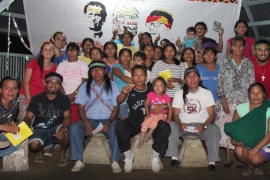ECUADOR: Salesians provide education in Achuar communities

Salesian missionaries have been working among the Achuar for the last 50 years
(MissionNewswire) Salesian missionaries have been working with the Achuar, an indigenous population in the Ecuadorian Amazon, for the last 50 years. The Italian missionary Luigi Bolla was the first to live among the Achuar, sharing his life. Half a century later, Salesian work continues to focus on spiritual development, education, and human, social and cultural promotion.
The Achuar people accepted Salesian missionaries from the very start. Salesian work has succeeded in ending wars between tribes and families, and it has also provided an opportunity to help new generations through education.
In 1988, the Achuar asked Salesian missionaries to start a mission in Wasakentsa. Salesians launched a school and a boarding school to educate Achuar youth. Today, there are 110 students and 80 interns. There are also 50 Achuar university students who come to study from far away locations. In addition, Salesians have a church that supports 49 Achuar communities in the surrounding area. Nearly 40 percent of the Achuar population is youth who dream of studying and having a better life.
“This is a remote area that can only be reached on foot because there are no roads, but Salesians remain working among the people,” said Father Gus Baek, director of Salesian Missions, the U.S. development arm of the Salesians of Don Bosco. “Salesians provide education, and they also provide basic needs and support youth in finding employment to help them become self-sufficient and in turn help their community.”
During the COVID-19 pandemic and the lockdown, everything has been more difficult. There have been infections and deaths among the Achuar community, but Salesian missionaries have remained, supporting the Achuar.
Ecuador is one of the most inequitable societies in the world, according to UNICEF. The richest 20 percent of the population receives almost 50 percent of the national income, while the poorest 20 percent receives only 5 percent. According to the World Food Program, almost 26 percent of all children under age 5 have stunted growth, increasing to 31 percent in rural areas and 47 percent in indigenous communities.
Close to 20 percent of Ecuador’s population is people of indigenous heritage. For poor, rural and indigenous youth, education provides the best opportunity for finding employment, reducing inequities and breaking the cycle of poverty. Salesian missionaries have been providing education and other social programs for disadvantaged youth across Ecuador for more than 125 years.
###
Sources:
ANS Photo (usage permissions and guidelines must be requested from ANS)
ANS – Ecuador – Half a century of presence among the Achuar
Salesian Missions – Ecuador
UNICEF – Ecuador





